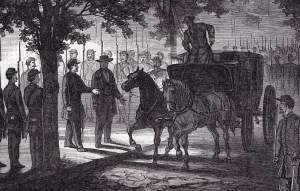Civil Liberties Suspensions (Tindall, 1999)
Textbook
Coercive measures against disloyalty were perhaps as much a boost as a hindrance to Democrats, who took up the cause of civil liberty. Early in the war Lincoln assumed the power to suspend the writ of habeas corpus, which entitles people in jail to a speedy hearing. Lincoln also subjected "disloyal" persons to martial law - often on vague suspicion. The Constitution said only that habeas corpus could be suspended in cases of rebellion or invasion, but congressional leaders argued that Congress alone had authority to act, since the provision fell in Article 1, which deals with the powers of Congress. When Congress, by the Habeas Corpus Act of 1863, finally authorized the president to suspend the writ, it required officers to report the names of all arrested persons to the nearest district court, and provided that if the grand jury found no indictment, those arrested could be released upon taking an oath of allegiance.
George Brown Tindall and David E. Shi, eds., America: A Narrative History, 5th ed., vol. 1 (New York: W. W. Norton and Company, 1999), 767-768.












